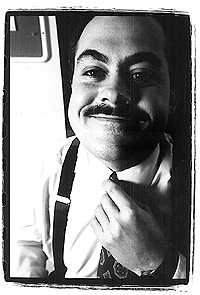Media Top 10
By Chris Walters, Fri., Jan. 10, 1997
 Wyatt Roberts' prayers for a Triangle flame-out went unanswered |
All of which is a useful reminder that years are merely watermarks and top ten lists nothing more than quickly drawn charts. If this one seems more or less adequate, don't worry. Enjoy the illusion while it lasts; everything will change during the time it takes you to read it. (Trends and events are listed in no particular order. Local and national items are not separated because no one experiences them that way.) 1. Blaming the Internet. As the ultimate version of a teeming, uncontrolled orgy of communication -- not unlike the underground press in France before the Revolution of 1789 -- the Internet provoked concern and occasionally wild alarm among the paid gatekeepers of information. A catalog of horrors was invoked. College students, teenagers, office workers wasting time online! Perverts getting in touch! Bad information flowing like water! As John Schwartz wrote in the Washington Post, "People lately are willing to make the most amazing stretches of fact and reason to blame the Net. When Pierre Salinger held a Paris press conference to announce what turned out to be a bogus TWA Flight 800 conspiracy that had been floating around online discussions for months, stories in The New York Times and Chicago Tribune painted the Internet as a conduit of unreliable information. As if Salinger couldn't do what thousands of others who read that message had done: dismissed it as a paranoid fantasy, one more Net urban legend like the Neiman Marcus $250 cookie recipe."
2. Rich Oppel, Editor in Chief of the Austin American-Statesman. The newspaper everyone loves to malign still suffers from hidden agendas, missed opportunities, and occasional cluelessness. None of that should obscure Oppel's achievement in turning it around and launching it down a better road. When people talk about him behind his back, they describe an intelligent and determined character, disrespectful of sacred cows and quick to fix mistakes. (This was not the case with previous Statesman editors, to put it mildly.) Changing the tone and direction of a large enterprise like the Statesman is an infinitely complex task, and it takes time. In 1996, his second year on the job, Oppel moved the behemoth markedly closer to the goal of a sophisticated urban daily. Given the pressure he must be under from the parent corporation in Atlanta to stay profitable no matter what, this was no mean feat.
3. The Marriage of Time-Warner and Turner Communications. This should be taken as a positive sign. As with the latifundias of ancient Rome, excessive size in the world of media giants is a necessary prelude to eventual fragmentation and collapse. Until then, the faux hipness of magazines such as Time and the mock worldliness of news servers such as CNN will grow more desperate and less convincing.
4. Samsung is Coming! This unfortunately titled series by the KEYE-42 news team offered a glimpse of local television at its most shameless. Ostensibly a look at Austin's newest corporate citizen, it was boosterism in the raw, "news" as pure corporate promotion, and probably a glimpse of the future.
5. KVUE-24 Listens to You on Crime. Only in the world of TV news does applying common sense to crime coverage in a peaceful city qualify as a radical innovation. KVUE's new crime policy, which boiled down to "if this is just another episode of senseless violence, let's blow it off," garnered national coverage and established it as the class act in the Austin market. Amusingly, the tactic drove its sensation-prone competitor, KEYE-42, nuts. As of this writing, however, KEYE had taken the top ratings spot away from KVUE.
6. Liberal Media, R.I.P. When Bob Dole failed to whip up excitement over the idea that the Liberal Media were fawning over Closet Liberal Bill Clinton, his campaign gave way to unfettered desperation. The media fawned over Clinton because they respect adroit powerholders, and no one outside the lunatic right really believes in the Liberal Media any more. If there were such a thing, last year would have seen headlines like "Contempt for poor people reaches new heights with welfare law," or "Overdevelopment yields bitter fruit as floods ravage Northwest."
7. The Triangle Survives. The current media economy does not favor the survival of small regional newspapers devoted to a cause or an idea. Drastic, simultaneous price increases engineered by the American paper cartel have dealt especially devastating blows, creating huge and sudden increases in production costs. So it was no surprise last summer when The Texas Triangle, a weekly newspaper that brought a new professionalism to the reporting of gay and lesbian issues in Texas, announced that it was closing up shop. Distributed in Austin and Houston, it had survived years of shoestring budgets and a campaign by talk radio demagogue Wyatt Roberts that backfired hilariously, actually attracting advertisers for a time. Thus it was heartening when a show of community support gave the paper the wherewithal to pay off some debts and get back in the fray, resuming publication after only a few weeks' hiatus. It remains to be seen whether small, specific-interest newspapers can survive the high costs of production without migrating online.
8. Saturation. Media consultants spent three times as much money in 1996 as they did in 1992 to achieve the same wretched turnout at the polls, and surveys showed television viewership declining among people born after the Sixties. This should tell us something. And when a series in the San Jose Mercury News, a small newspaper given extra clout via inspired online presentation, inflamed black Americans with its story of CIA connivance in the drug trade while barely causing a shrug among the majority, that should tell us something, too.
9. Disaster. Carnage was the overwhelming motif of news coverage in 1996, and for good reason. As planes dropped from the sky like confetti and hurricanes reduced communities to toothpicks, they offered a welcome distraction from a huge, complex, and frightening story that will not go away: the human destruction wrought by the shift to a global economy.
10. Dead Media. Local novelist and polemicist Bruce Sterling and California colleague Richard Kadrey began this inspired research project in 1995, the results of which can be found by typing "dead media" into any search engine (a useful though unofficial site is at www.islandnet.com/~ianc/dm/dm.html). A perfect antidote to the hubris of media enthusiasts who think that a capacity for relentless communication somehow amounts to a transcendent breakthrough, this catalog of ephemera -- hieroglyphics, the Incan quipu, Navajo code-talking, the Scopitone, the Apple IIe, and dozens more -- lent invaluable perspective. Dead media litter human history, and the morgue never closes.
Got something to say on the subject? Send a letter to the editor.








